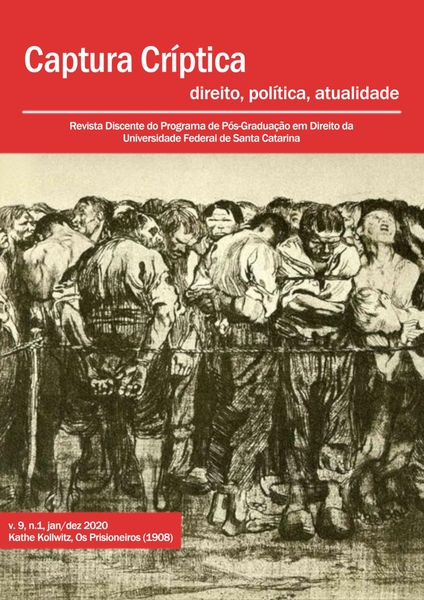Plea bargaining in white collar: analysis of the judiciary’s discourse in the Mensalão’s case
Keywords:
Discourse analysis, plea bargaining, mensalão, white collar criminalityAbstract
In the present article, we shall analyze the Supreme Court Justices’ votes in the criminal case popularly known as “Mensalão”, aimed at studying how the plea bargaining institute is described in the judicial discourse, as a human rights guarantee, and what the found dispersions reveal about this discoursive formation. In the first section, we describe multiple approaches on the white collar criminality, in order to link this particular sort of criminality with the plea bargaining institute. In the second section, our theoretical assumptions and backgrounds are clarified, departing from Foucault’s “Archaeology of Knowledge” and discourse studies methodology, understanding that the units of analysis must be derived from the description of dispersions, in which the text is conceived as a materialization of the discourse. The second part is dedicated to the discoursive analysis itself. In the third section, the plea bargaining is approached as a benefit to the defendants who cooperate, demonstrating that the special treatment is not uniformly described, but depends on the context. In the forth section, the benefits of the institute to the State are emphasized, clarifying how relevant the plea bargaining is considered by the judicial discourse. In the fifth section, we approach the probation value provided by the plea bargaining, explaining that the defendants testimonies are considered unreliable evidence. In the conclusion, we balance the dispersion found in the judicial discourse towards the plea bargaining institute, in order to demonstrate some of the guidelines of the analyzed discoursive formation.
References
ALTHUSSER, Louis. Aparelhos ideológicos de Estado. 2. ed. Rio de Janeiro: Graal, 1985.
BARATTA, Alessandro. Criminologia crítica e crítica do direito penal: introdução à sociologia do direito penal. 3. ed. Trad. Juarez Cirino dos Santos. Rio de Janeiro: Revan: Instituto Carioca de Criminologia, 2002.
BRASIL. Supremo Tribunal Federal. Ação Penal nº 470. Relator: Ministro Joaquim Barbosa. Brasília, DF, 28 de novembro de 2013. Diário da Justiça Eletrônico. Brasília, 03 dez. 2013. Disponível em: <ftp://ftp.stf.jus.br/ap470/InteiroTeor_AP470.pdf>. Acesso em: 05 maio 2016.
______. Constituição Federal (1988). Disponível em <http://www.planalto.gov.br/ccivil_03/constituicao/constituicao.htm>. Acesso em: 09 nov. 2017.
______. Lei n.º 12.850, de 2 de agosto de 2013. Disponível em <http://www.planalto.gov.br/ccivil_03/_ato2011-2014/2013/lei/l12850.htm>. Acesso em: 09 nov. 2017.
CASTELLS, Manuel. O poder da identidade. Vol. 2. Trad. Klauss Brandini Gerhardt. São Paulo: Paz e Terra, 1999.
CHARAUDEAU, Patrick. Discurso político. Trad. Fabiana Komesu e Dilson Ferreira da Cruz. São Paulo: Contexto, 2008.
CERVINI, Raul. A cifra negra da criminalidade oculta. Trad. José Henrique Pierangelli; Maria Alice Andrade Leonardi. Revista do Ministério Público do Rio Grande do Sul. Rio Grande do Sul, n. 28, 1992. Disponível em <http://www.amprs.org.br/arquivos/revista_artigo/arquivo_1285251973.pdf>, Acesso 12.04.2017.
COSTA, Arthur Trindade Maranhã; MACHADO, Bruno Amaral; ZACKSESKI, Cristina (orgs). A investigação e a persecução penal da corrupção e dos delitos econômicos: uma pesquisa empírica no sistema de justiça federal. Tomos I e II. Brasília: ESMPU, 2016.
COURTINE, Jean Jacques. Análise do discurso político: o discurso comunista endereçado aos cristãos. São Carlos: Edufscar, 2009.
CRESSEY, Donald R. “Criminological research and the definition of crimes.” American Journal of Sociology. Vol. 56. n. 6 (maio 1951). p. 546-551. Disponível em <http://www.jstor.org/stable/2772472>, Acesso em 23 ago. 2017.
FERNANDES, Cleudemar Alves. Análise de discurso: reflexões introdutórias. 2. ed. São Carlos: Claraluz, 2007.
FOUCAULT, Michel. A arqueologia do saber. 7. ed. Rio de Janeiro: Forense Universitária, 2009.
______. A ordem do discurso. Trad. Laura Fraga de Almeira Sampaio. 5. ed. São Paulo: Loyola, 1999.
_______. A verdade e as formas jurídicas. 3. ed. Rio de Janeiro: Nau, 2012.
GROSSI, Paolo. Mitologias jurídicas da modernidade. Trad. Arno Dal Ri Júnior. Florianópolis: Fundação Boiteux, 2004.
HESPANHA, António Manuel. Pluralismo jurídico e direito democrático: prospetivas do direito no séc. XXI. Versão atualizada (eBook Kindle), 2016.
INDURSKY, Freda. Remontando de Pêcheux a Foucault: uma leitura em contraponto. Disponível em < http://www.ufrgs.br/analisedodiscurso/anaisdosead/1SEAD/Paineis/FredaIndursky.pdf> Acesso em 19.12.16.
PÊCHEUX, Michel. Remontemos de Foucault a Spinoza. Trad. Maria do Rosário Gregolin. Edição original: PÊCHEUX, Michel. Remontons de Foucault à Spinoza. In. L’Inquietude du discours. Textes choisis par D. Maldidier. Paris: Cendres, 1977.
KATZ, Jack. Legality and Equality: Plea Bargaining in the Prosecution of White-Collar and Common Crimes. Law & Society Review, vol. 13, no. 2, 1979, p. 431–459. Disponível em JSTOR, , Acesso em 19. out. 2017.
LASCOUMES, Pierre; NAGELS, Carla. Sociologie des élites délinquantes: de la criminalité en col blanc à la corruption politique. Paris: Armand Collin, 2014.
LIPPKE, Richard L. The ethics of plea bargaining. Nova Iorque: Oxford University Press, 2011. p. 147-148.
MAINGUENEAU, Dominique. Gênese dos discursos. Trad. Sírio Possenti. São Paulo: Parábola, 2008.
MUSSALIM, Fernanda. Análise do discurso. In: MUSSALIM, F.; BENTES, A. C. (Orgs.) Introdução à linguística: domínios e fronteiras. 4. ed. São Paulo: Cortez, 2004. p. 101-142. v. 2.
OLIVEIRA, Eugênio Pacelli de. Curso de processo penal. 19. ed. rev. e atual. São Paulo: Atlas, 2015.
SHAPIRO, Susan. “Collaring the crime, not the criminal: reconsidering the concept of white-collar crime.” American Sociological Review. Vol. 55, No. 3 (Jun., 1990), p. 346-365. Disponível em <http://www.jstor.org/stable/2095761?seq=2#page_scan_tab_contents>, Acesso em 22. ago. 2017.
SUTHERLAND, Edwin H. Crime de colarinho branco: versão sem cortes. Trad. Clécio Lemos. 1. ed. Rio de Janeiro: Revan, 2015.
Downloads
Published
Issue
Section
License
Copyright (c) 2021 Raíssa França, Alexandre Ribas de Paulo

This work is licensed under a Creative Commons Attribution-NonCommercial-NoDerivatives 4.0 International License.
Submissions published in the Captura Críptica Journal are under the Creative Commons Attribution-noncommercial-NoDerivatives 4.0 International License.










